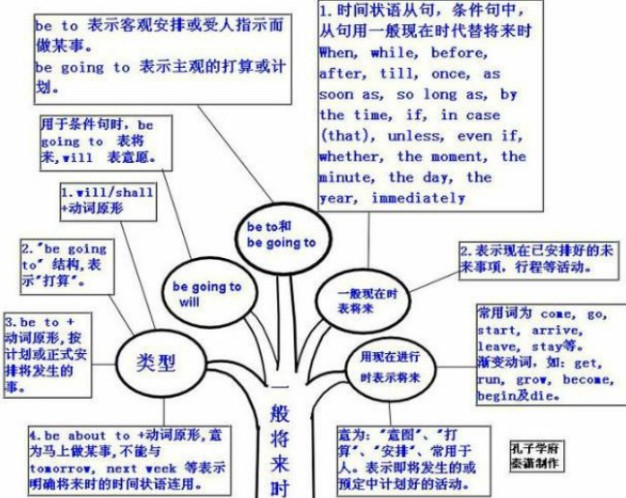本试题 “It_________five or ten years before the new medicine is tested on human beings.[ ]A. will takeB. tookC. takesD. has taken” 主要考查您对一般将来时
等考点的理解。关于这些考点您可以点击下面的选项卡查看详细档案。
- 一般将来时
一般将来时的概念:
一般将来时表示将来某一时刻的发生动作或状态,或将来某一段时间内经常的动作或状态。常与表示将来的时间状语连用。
一般将来时用法:
1)shall用于第一人称,常被will所代替。will在陈述句中用于各人称,在征求意见时常用于第二人称。
例如:Which paragraph shall I read first?我先读哪一段呢?
Will you be at home at seven this evening? 今晚七点回家好吗?
2)be going to+不定式,表示将来。
a. 主语的意图,即将做某事。
例如:What are you going to do tomorrow? 明天打算作什么呢?
b. 计划,安排要发生的事。
例如:The play is going to be produced next month。这出戏下月开播。
c. 有迹象要发生的事。
例如:Look at the dark clouds, there is going to be a storm. 看那乌云,快要下雨了。
3)be+不定式表将来,按计划或正式安排将发生的事。
例如:We are to discuss the report next Saturday. 我们下星期六讨论这份报告。
4)be about to+不定式,意为马上做某事。
例如:He is about to leave for Beijing. 他马上要去北京。
注意:be about to do不能与tomorrow, next week 等表示明确将来时的时间状语连用。
一般将来时知识体系:

一般现在时表将来:
1)下列动词come, go, arrive, leave, start, begin, return的一般现在时可以表示将来,主要用来表示在时间上已确定或安排好的事情。
例如:The train leaves a tsix tomorrow morning. 火车明天上午六点开。
—When does the bus star? 汽车什么时候开?
—It stars in ten minutes. ?十分钟后。
2)以here, there等开始的倒装句,表示动作正在进行。
例如:Here comes the bus.=The bus is coming. 车来了。
There goes the bell.=The bell is ringing. 铃响了。
3)在时间或条件句中。
例如:When Bill comes(不是will come), ask him to wait for me. 比尔来后,让他等我。
I'll write to you as soon as I arrive there. 我到了那里,就写信给你。
4)在动词hope, take carethat,makesurethat等的宾语从句中。
例如:I hope they have a nice time next week. 我希望他们下星期玩得开心。
Make sure that the windows are closed before you leave the room. 离开房间前,务必把窗户关了。
现在进行时表示将来:
下列动词come, go, arrive, leave, start, begin, return等现在进行时可以表示将来。
例如:I'm leaving tomorrow. 明天我要走了。
Are you staying here till next week? 你会在这儿呆到下周吗?
与“It_________five or ten years before the new medicine is t...”考查相似的试题有:
- -Mr Li has been in hospital for 3 days.-Oh,really.I________.________to see him after work.[ ]A.don’t know;I’ll goB...
- In the near future,more advances in the robot technology ________ by scientists.(2011·湖南)A.are makingB.are madeC...
- Look out! That truck _____ you!Thanks for warning me![ ]A. will hitB. was hittingC. is going to hitD. hits
- By the time you have finished this book, your meal ______ cold.[ ]A. getsB. has gotC. will getD. is getting
- As soon as he comes back, I'll tell him when _____ and see him.[ ]A. you will comeB. will you comeC. you comeD. do yo...
- 短文改错。假定英语课上老师要求同桌之间交换修改作文,请你修改你同桌写的以下作文。文中共有10处语言错误,每句中最多有两...
- —How about buying Sam a mobile phone? After all, he isn't a boy any more.—I think it necessary, for we sometimes want...
- —When you off to Guangzhou?—Next Thursday evening.[ ]A. are; goingB. would; goC. are; goD. do; go
- — How can I apply for an online course?— Just fill out this form and we _____ what we can do for you.A. seeB. are see...
- What a big wind and dark clouds! I think it _______.A. is going to rainB. will rainC. is rainingD. is rainy